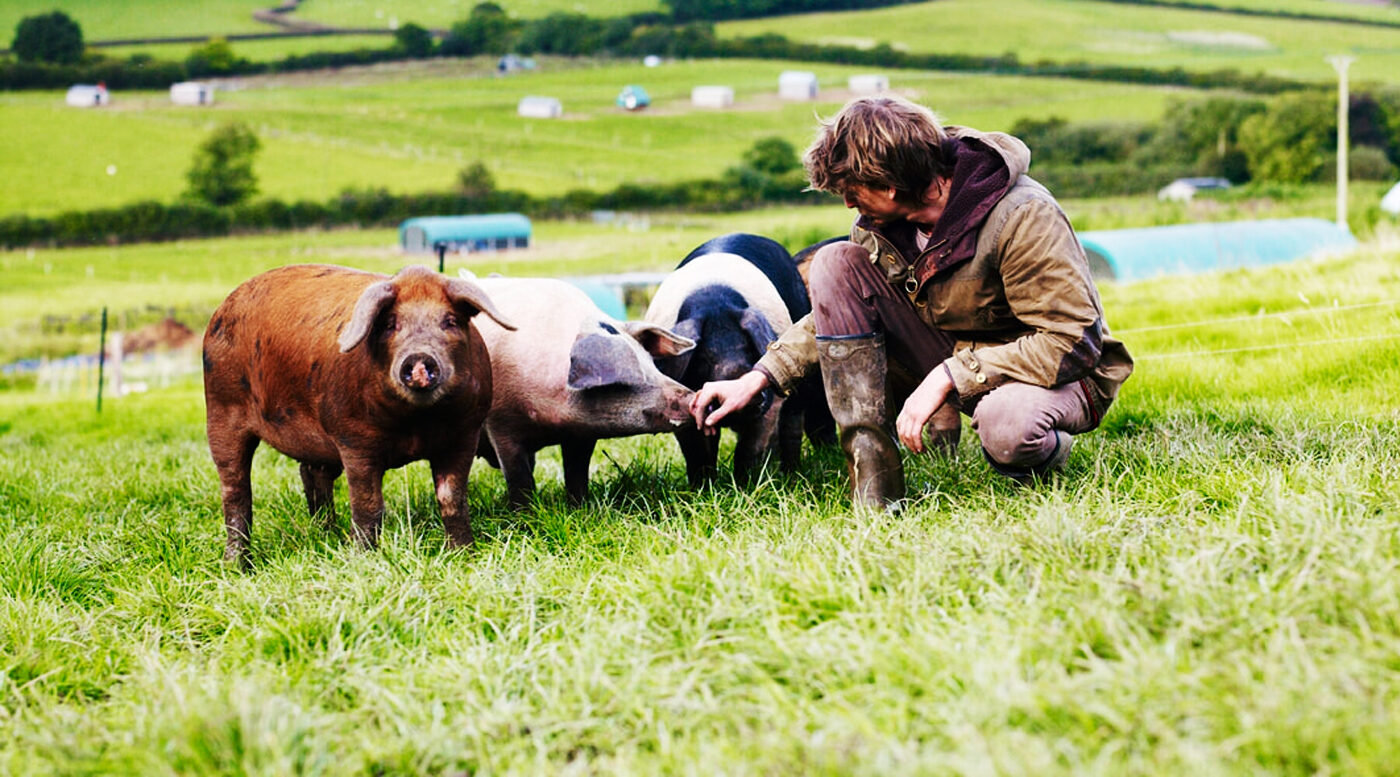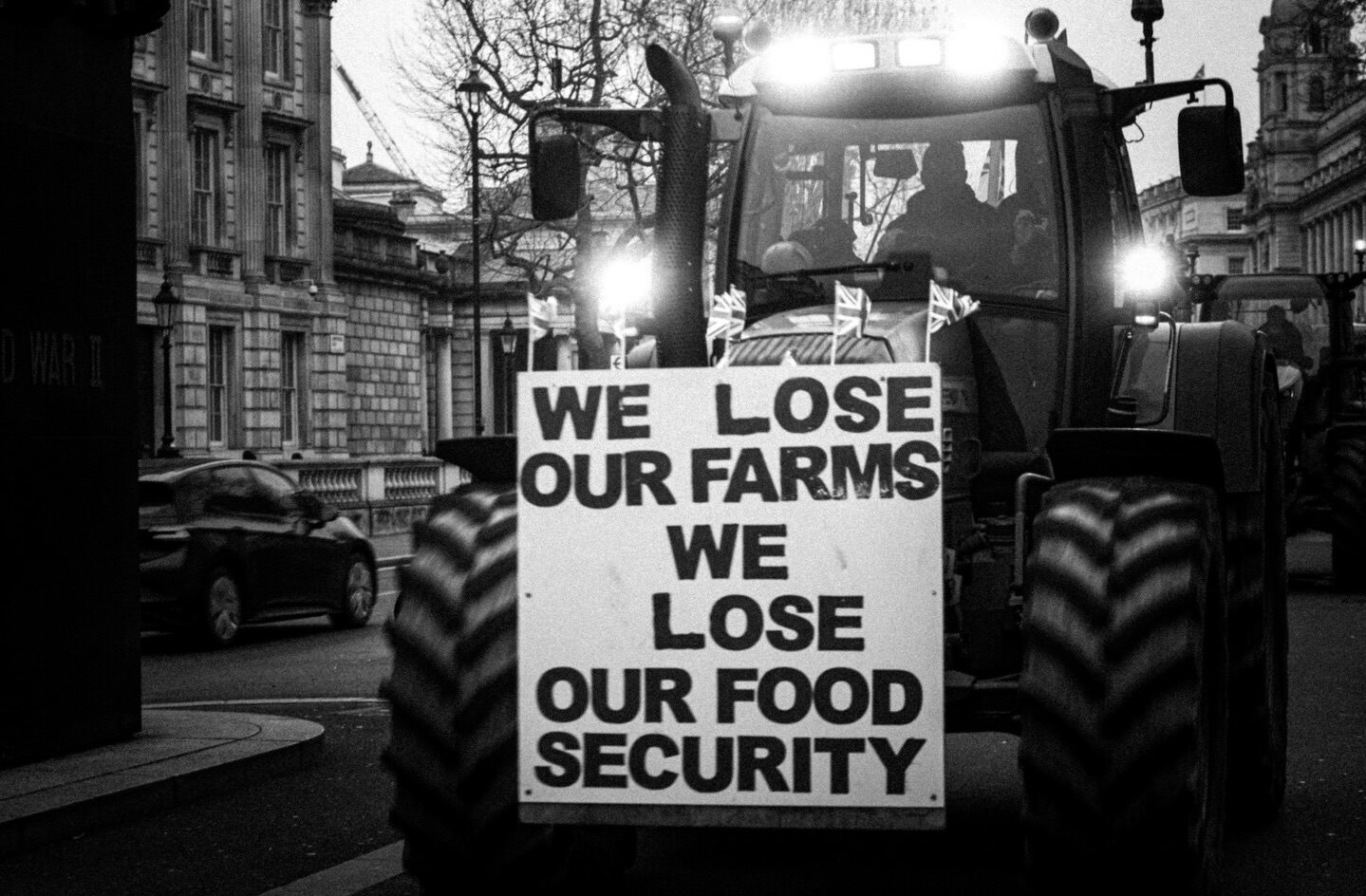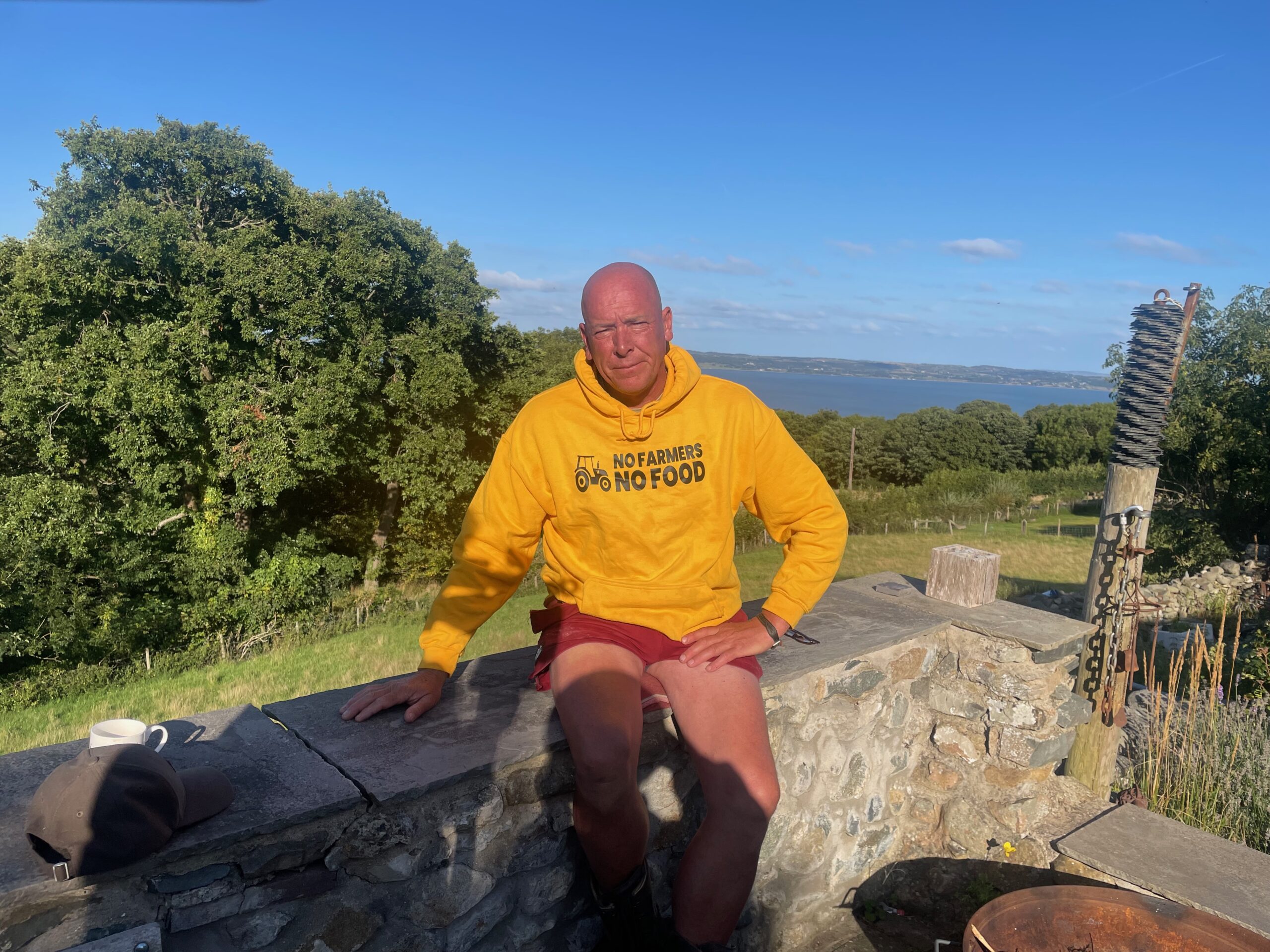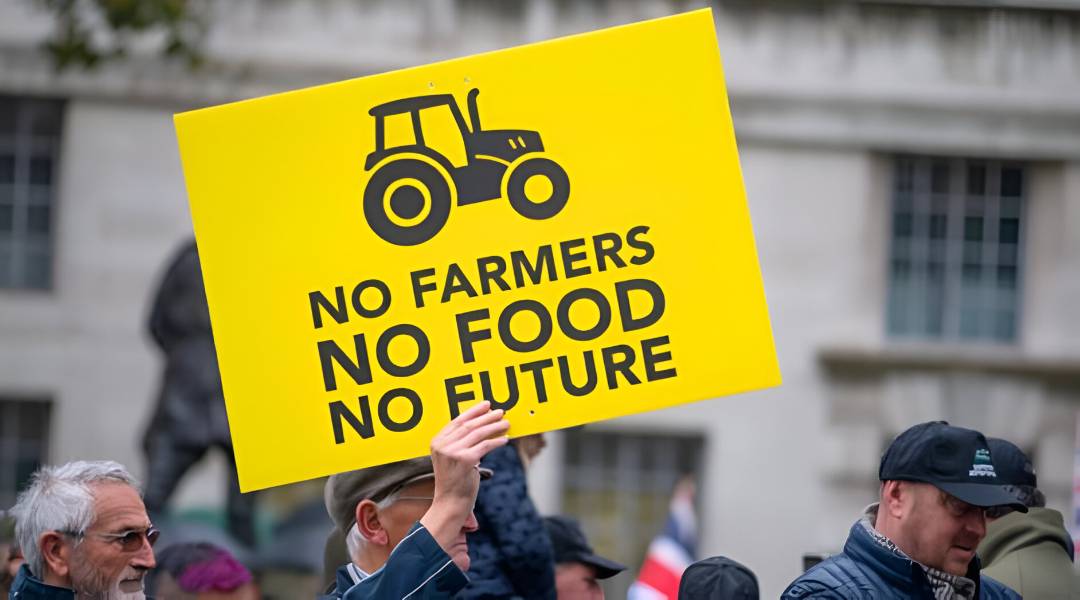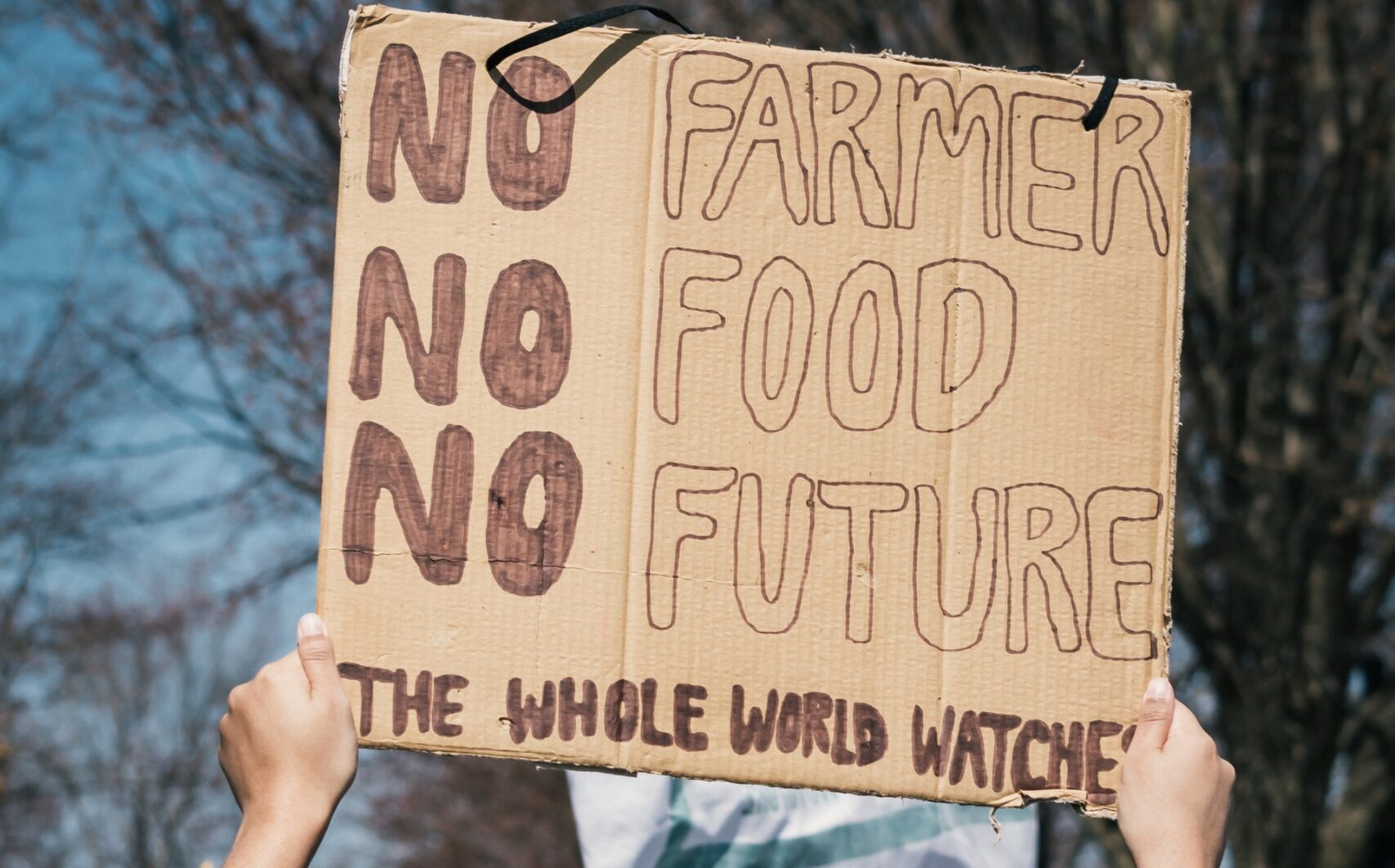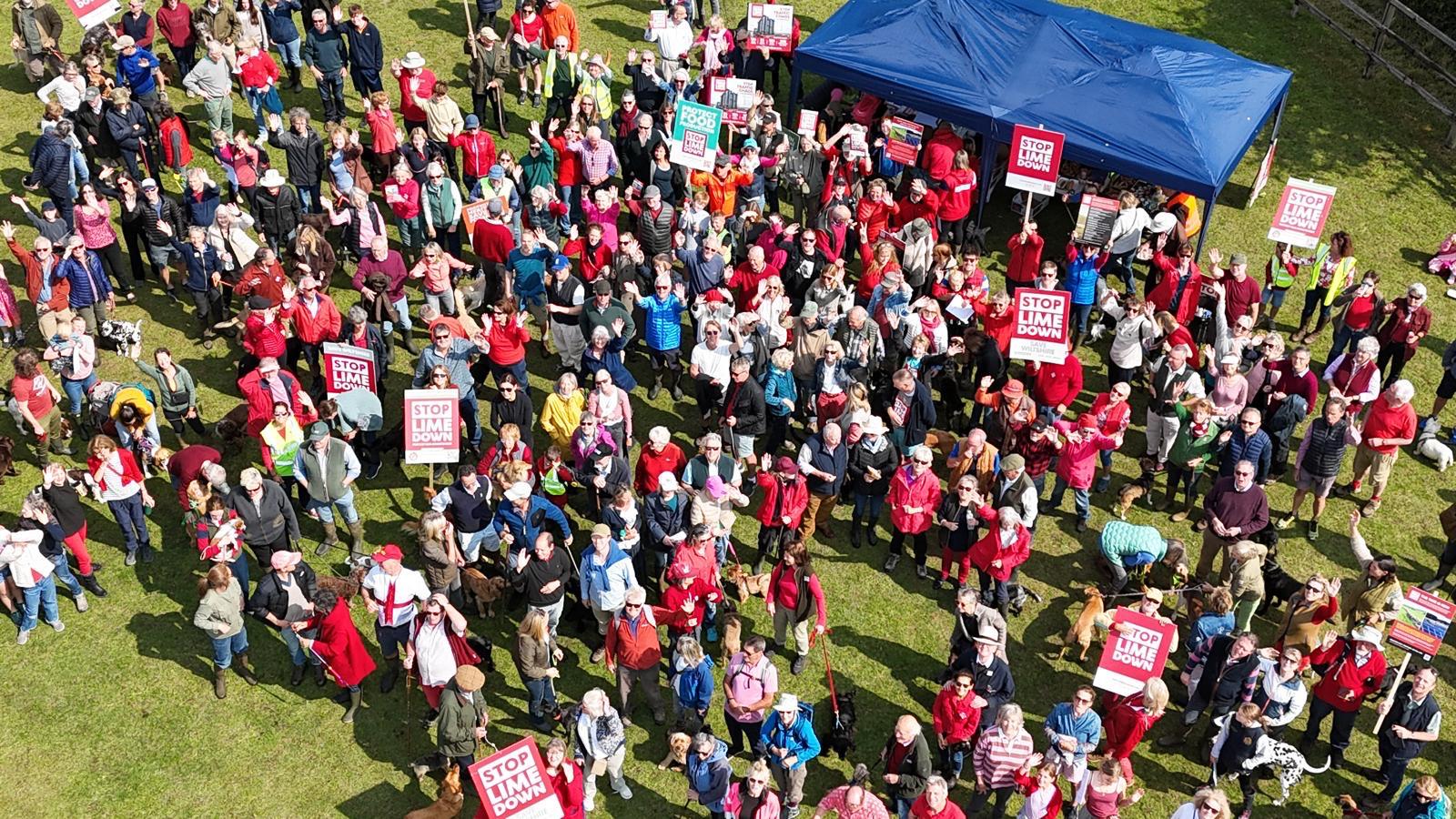TV chef and award winning food writer Gill Meller and organic farmer Harry Boglione of Haye Farm, co-star in the first of our new Rooting for Real Farms video series. In these videos, top chefs team up with high welfare farmers, urging people to end factory farming by using the power of their purse to only buy from local, high welfare farms. Harry’s business, Haye Farm, was badly hit by the closure of Farmdrop, so please fill the gap by buying direct from Haye Farm online. Please support high welfare farmers like Harry by giving the video below a like and a share.
Each video in the Rooting for Real Farms series shows a famous chef preparing a delicious pork dish while describing that they’d only ever use high welfare meat due to the better taste and texture compared to factory produced pork and how their customers are increasingly concerned about cruel and unhealthy practises in factory pig farming. The farmers show us their pigs living outdoors with plenty of room to root and exercise in the fresh air.
Councils Must Divest from Big Ag
Feedback’s Campaign asks us to lobby our Councils to divest Council Pensions from Big Livestock. The UK’s local councils are pouring £238 million in pension fund money into industrial livestock investments, fuelling a destructive industry which causes climate change, deforestation, human rights abuses and industrial-scale animal cruelty. Will you join Feedback in calling on local councils to divest from industrial livestock by emailing your local council? It only takes 2 minutes.
A Twitter-Storm is Coming…
The Scrap Factory Farming legal campaign has succeeded in getting a court hearing which will take place on Tuesday 25th January. Ahead of this crucial next step, they need people to send a message to Defra to show them how urgently they need to address the risks from factory farming and how important it is that a full judicial review is conducted. On Monday 24th January please support the campaign by sharing one of the four template tweets below: If possible, please tweet between 7am and 9am GMT but all support is welcome throughout the day. Alternatively you can post one of these campaign images to Facebook or Instagram using one of the template tweets below as the post text.
- TWEET 1: The UK government is not doing enough to protect the public from the associated risks of factory farming. @DefraGovUK, needs to conduct a full review of the impact on human health. #ScrapFactoryFarming
- TWEET 2: How much worse do the impacts of factory farming have to get before @DefraGovUK will conduct a full review of the risks posed to human health? #ScrapFactoryFarming
- TWEET 3: Now is the time for @DefraGovUK to conduct a full review of the risks of factory farming to the British public. #ScrapFactoryFarming
- TWEET 4: Factory farms pose a significant risk for zoonotic disease outbreaks with pandemic potential, and accelerate the development of antibiotic resistance. It is time for @DefraGovUK to put in place appropriate safeguards to protect the public. #ScrapFactoryFarming
Farmed Animals Need our Help
The five animal freedoms originally developed by the UK’s Animal Welfare Committee are: freedom from hunger and thirst; freedom from discomfort; freedom from pain, injury or disease; freedom to express normal behaviour; and freedom from fear and distress, and, (excluding the first) these freedoms are intrinsically broken by farmers in the UK and across the globe. Farmers have to cram ever more pigs into their sheds and invest in giant factory farms to compete with economies of scale and cheap imports.
Livestock are Suffering as Never Before;
‘Losing farmed animals to disease used to be a cost of doing business. However, the rapid expansion of industrialised animal agriculture over the past few decades has exacerbated the problem: crowding millions of stressed-out animals into cramped, filthy spaces drastically reduces their immunity and makes them vulnerable to diseases and the spread of diseases. ’
Broken laws
On paper, UK Animal welfare laws are world leading but in reality the laws are broken. The reasons include;
- Otherwise UK farmers can’t compete when animal welfare laws are routinely ignored in EU factory farms which supply almost half the pork consumed in the UK.
- Giant global pork producers such as US based Smithfield Foods and Danish Poldanor, take advantage of cheaper labour and land, and lax law enforcement in Eastern Europe, pushing EU prices down.
- Furthermore, the EU sources cheap low welfare pork from outside the EU, through trade derogations, further undermining UK pig farmers.
Broken Promises
The Government’s onslaught against farmers continues as farmers face uncertainty about future subsidies (ELMs) that, though promised to be equivalent to the EU farm payment (BPS), the signs are that payments from the new scheme will be only a fraction of those under the BPS which is now being tapered off over the next six years.
‘So far, only one thing is absolutely clear: ELMs will not be a full substitute for the EU Basic Payment Scheme. At best, farmers will be able to make up about a third of BPS through ELMs.’
As financial pressures mount, in a new parliamentary report, MPs anticipate that many small and tenant farmers across England may be put out of business if the government doesn’t step in to fill the financial gap.
Another broken Brexit promise was that all EU laws would be copied into UK law and then amended to suit farmers’ and citizens’ needs. However, along with excluding a whole set of existing EU rules that promoted social justice and environmental protections, the Tories left out the animal sentience legislation, Article 13 of the Lisbon Treaty, which led to a public outcry.
Animal Welfare (Sentience) Bill – Making its way through Westminster
Following the manifesto promise to “bring in new laws on animal sentience”, the Government has introduced the Animal Welfare (Sentience) Bill which received an unopposed second reading in the Commons,18th January (Hansard), and will undergo further scrutiny at a later date. Shining a light on this controversial Bill at this stage might encourage people to look at the incredibly wide debate and lobby their MP for changes before it is too late.
George Eustice, Secretary of State for DEFRA, introduced the bill;
“During the European Union era, the UK was a signatory to article 13 of the Lisbon Treaty, which offered a form of legal recognition of the sentience of animals. Although that did not really mean very much, we believe we can now do better through this Bill.”
“The Bill proposes four things. First, it establishes an Animal Sentience Committee, whose members the Secretary of State will appoint on the basis of expertise and experience. Secondly, it tasks that committee with scrutinising Ministers’ policy formation and the implementation of decisions. In each instance, it will publish a report containing its views on whether Ministers have had all due regard to the welfare needs of animals as sentient beings.”
“Thirdly, Ministers will be held to account through a duty to respond to the committee’s reports, by means of a written statement to Parliament, and Parliament must receive such responses within three months.”
In the hope that the bill will improve farm animals’ plight, I signed the Compassion in World Farming petition asking my MP to vote for the The Animal Welfare (Sentience) Bill. However, when I delved into it for this newsletter, I found serious deficiencies that I can only hope will be solved via some of the MPs’ amendments to the bill at the committee stage. These include:
- There is no provision in the bill that demands that meat imports have been produced in compliance with our animal welfare standards to prevent ever lower standards in the UK.
- The bill does nothing to enforce existing animal welfare laws in UK factory farms.
- Ministers can overrule the Committee if their recommendations hinder economic activity even if it has an impact on animals.
- The bill does not protect country pursuits that have proved to enhance wildlife and protect species from cruder and crueller forms of culling and vermin management.
Listen to the 2nd reading in the House of Lords on June 16th (at 13mins.06 secs) and the MPs 1st reading in the House of Commons, 18th of January (15mins.01 secs). I have extracted a few quotes from MPs and Lords (links go to the 2 Hansard scripts) where they share my concerns;
Trade Trumps Welfare
“What is difficult to reconcile however, is that while animal welfare standards are constantly being raised here in the UK, the same is not true across the world. I am very proud that British farmers are leading the way, but it is a fact that many are facing a cliff edge, and with changes to EU subsidies favouring landowners keen to diversify away from farming to biodiversity schemes, it has come at the worst possible time. We are seeing food left rotting in the fields and some 20,000 pigs culled, all because of entirely foreseeable labour shortages.”
To make matters worse, although the Government talk a good game on animal welfare, trade deals have been signed that not only undermine British farmers and producers, but allow the UK and its Government essentially to outsource animal cruelty in the supply chain to other countries. Take the UK-Australia trade deal: while we maintain high standards here in the UK and higher costs as a result, Australia allows intensive farming, which means that cattle may spend their entire life locked away without seeing a blade of grass, not to mention being trucked for 48 hours without rest, food or water, often in very hot conditions that would be illegal in the UK…..”.
“Will the Secretary of State commit to amending the Bill to prevent that, or at least to bring forward measures that will address those widely held concerns about how our domestic legislation interacts with trade deals that have so far been negotiated, and with those negotiated in future?”
Committee Deficiencies
The Bill does not define animal sentience nor say how it is measured and so, where animal welfare needs to be improved, Ministers will have no gauge to work against.
Lord Trees, Crossbench
“….there is much detail lacking about the committee’s role; on resourcing; its obligations; its composition; its powers and powers of inquiry, and, perhaps most important of all, its powers of sanction if its recommendations are ignored.”
Luke Pollard, MP; Labour/Co-op
“I suggest the Government take their own advice and make it a legal obligation for Departments to cooperate with the Animal Sentience Committee. That is another amendment that I hope will be moved in Committee. Perhaps the Environment Secretary will report annually on how many Departments are not co-operating with this new committee, as that would be very interesting for the House to know.”
Baroness Jones of Moulsecoomb, Green Party
“This Bill is the Government pretending to do something about animal sentience, because they know that the general public really care. It is a PR exercise, and it will not prove adequate for the situation we face. Essentially, the Government are hiving off their responsibility on animals to a committee.”
Traditional Rural Culture Protects Wildlife
Globalisation facilitates the centralisation of agriculture, and subsidies and tax incentives facilitate chemicals and machines to replace labour, and thereby increase farmers’ debt, forcing them to depend on their now diminishing subsidies. They are increasingly stressed, isolated, lonely and depressed; 133 people in UK farming and the associated agricultural trades took their own lives in 2019-20.
Traditional cultural pursuits like hunting, shooting and fishing are not only a community-building lifeline for farmers but, in most cases, also preserve and protect the flora and fauna so should be respected in the formulation and implementation of any policy, as it was in the sentience section in the original EU law.
Take hunting; when agro-chemicals destroy the biodiversity which sustains birds, mice, rabbits, rats, et al, it negatively impacts their numbers and diversity. So, their hungry predator including foxes, will turn more frequently to killing chickens (killing the lot but and taking only one away), lambs and calves. To farmers, foxes are obviously vermin and in areas without the traditional hunt (that disappeared under Tony Blair’s ban), they eradicate foxes with night guns (20 foxes can be killed and or wounded in a couple of hours) and traps, leaving the area devoid of foxes. So I was glad to hear Luke Pollard, MP Labour, presume that the Committee, as presently worded, could not be used to ban trail hunting;
“Trail hunting is an excuse for the live hunting of foxes and we need to close such loopholes. I am disappointed that this Bill does not provide the opportunity to do so.”
Below goes some way to explain how the fox has not benefited from the hunting ban
Baroness Mallineu, Labour
“My party spent more than 200 hours of parliamentary time on the Hunting Act, which brought no benefit at all to the fox population—quite the contrary. A method of control that was selective, with a closed breeding season, and left no wounded, was replaced with snaring and night shooting with none of those features, which killed and wounded far more.”
Sir Geoffrey Clifton-Brown, MP; Conservative (The Cotswolds)
“I will try to get an amendment included in the Billstating that “the recommendations by the committee must respect the legislative or administrative provisions and customs relating in particular to religious rights, cultural traditions and regional heritage”.
Corporate volatility and greed
Meanwhile, the UK pig farmers are in crisis caused by lockdowns and track & trace isolation rules around Covid illnesses that are slowing operations at giant processing plants. But, instead of our monopoly supermarkets such as Tesco and Asda using their massive buying power to helpfully buy British pork, as other supermarkets have, they have simply increased their (cheap, substandard) imports. I am not confident that the Sentience Bill will have the power to rid us of industrial farming’s barbaric cruelty, we must ‘be the change’ by only buying meat from independent high welfare farmers.
News roundup
Why we need good food in law to stop ‘corporations selling us food that makes us sick‘.
Meat Production to Blame For 90,000 Pollution-Related Deaths in China Every Year,
‘Excess nitrogen can damage the ecosystem & exposure to high concentrations of ammonia can lead to lung cancer, heart problems, blindness, or even death.’
Kildare beef farmer hasn’t reseeded or used fertiliser for over 20 years
Digital agriculture, as being proposed by giant agribusiness and data companies, should come with a warning for farmers, farm workers and food vendors.
Fake meat company holds 14 patents – ‘a product that’s the epitome of unnatural.’
UK supply chains no longer fit for purpose by Vicki Hird
At least 18 peaceful environmental protestors jailed in the UK in 2021
Helena Norberg-Hodge author of Ancient Futures discovers people in S Korea rebuilding their connections to nature and community.
Please donate
Forgive me for pointing out that, while we receive some one-off donations, I am funding Farms Not Factories myself, and if we are to continue to fight the cruel, antibiotic-led factory farm system, we will need some regular donations from like-minded people. Please consider a monthly subscription of £2/month and help us support a network of smaller scale, humane and healthy UK pig farms, local abattoirs and butchers.
“Our message is simple, we want to help bring an end to this dangerous, inhumane system. Vote for real farming over factory farming.”
– Tracy Worcester, Director
Contents
Share This Article
Related ArticlesView All
Protect UK Farmers from Low Standard Imports
The purpose of our newsletter is to give you important information that is censored in the mainstream media. “The way… Read More
Protectionism vs So-Called Free Trade
The purpose of our newsletter is to give you important information that is censored in the mainstream media. “The way… Read More
Find A Farmer
The purpose of our newsletter is to give you important information that is censored in the mainstream media. “The way… Read More
Zionist Money Rules
The purpose of our newsletter is to give you important information that is censored in the mainstream media. “The way… Read More
The Price of Progress
The purpose of my newsletter is to give you important information that is censored in the mainstream media. “The way… Read More
Silencing Dissent Through Fear
The purpose of my newsletter is to give you important information that is censored in the mainstream media. If you… Read More
